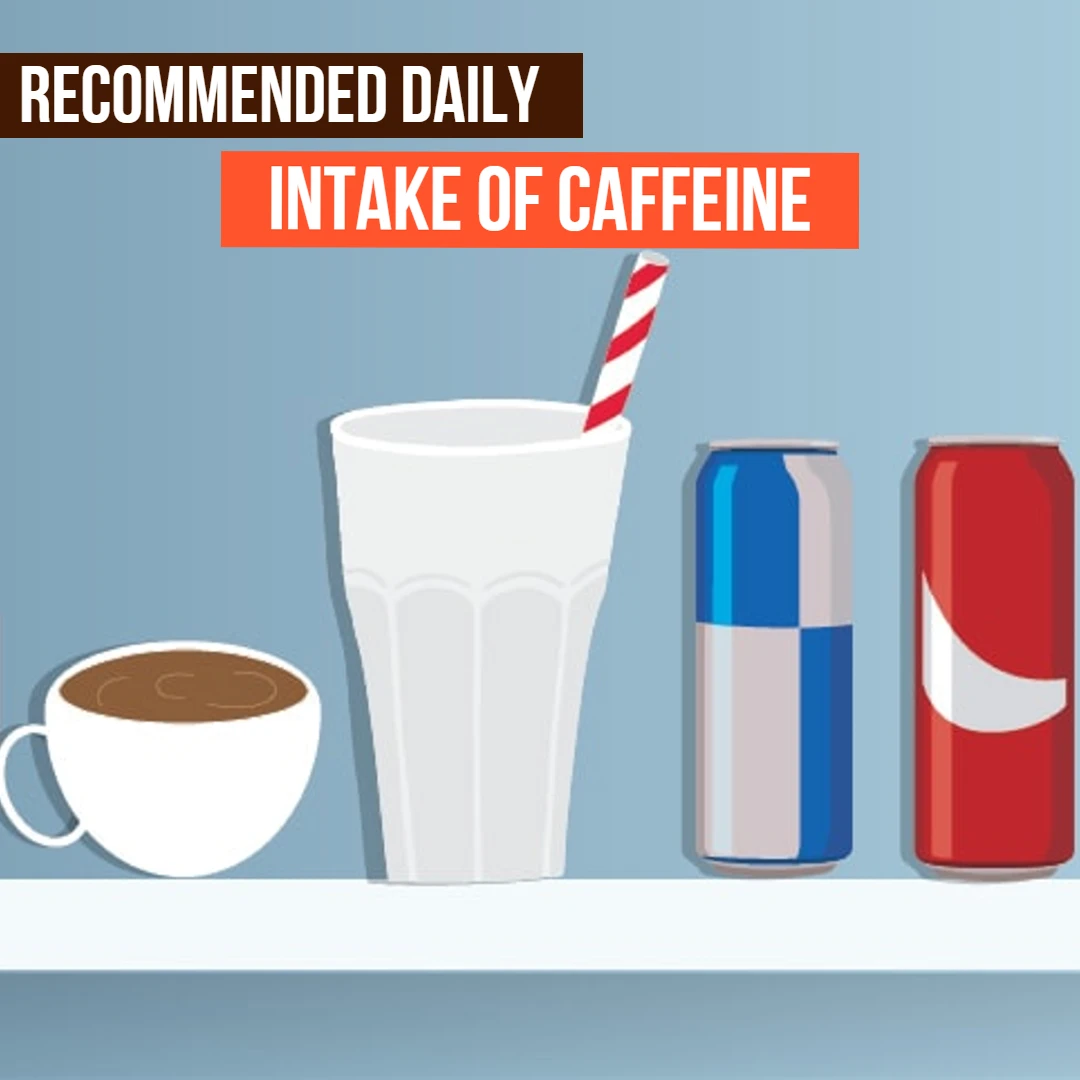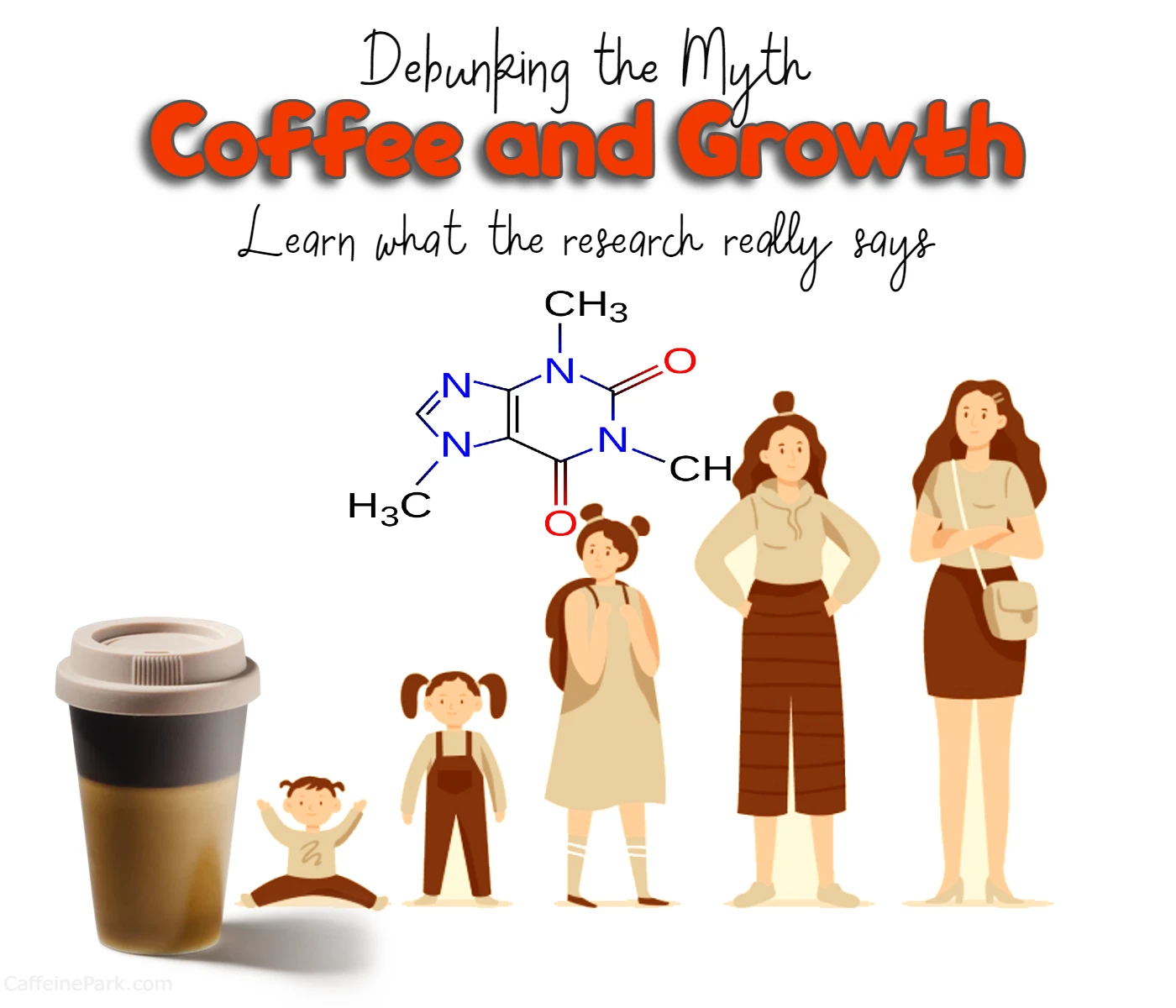How Much Caffeine is Too Much?

It is almost impossible to completely avoid caffeine. The question that arises is how much caffeine should we consume per day. Caffeine is a naturally occurring chemical compound that belongs to a class of substances known as purines. It is found in a variety of plant-derived products, including coffee, tea, chocolate, and certain medications. Caffeine is a stimulant that affects the central nervous system (CNS) by blocking the action of a chemical called adenosine. Adenosine is a neurotransmitter that is involved in the regulation of sleep and wakefulness. When caffeine blocks the action of adenosine, it can cause an increase in alertness, energy, and focus.
Recommended Daily Intake of Caffeine:
| Age | Recommended Daily Limit |
|---|---|
| Children and Adolescents | 100-200 mg/day |
| Healthy Adults | 400 mg/day |
| Pregnant Women | 200 mg/day |
Daily caffeine recommendation
The amount of caffeine that is considered “too much” can vary depending on a number of factors, including a person’s age, weight, and sensitivity to caffeine. The daily recommended limit for caffeine intake is 400mg per day for healthy adults. This is roughly the equivalent of 4 cups of brewed coffee or 10 cans of soda.
| Amount of Caffeine | Classification |
|---|---|
| 100 mg | Low to Moderate |
| 200 mg | Moderate |
| 300 mg | Moderate to High |
| 400 mg | Recommended Daily Limit |
| 500 mg | High |
| 600 mg | Very High |
| 800 mg | Extreme |
| 1000 mg | Extremely High |
| +1000 mg | Dangerous |
For older adults, caffeine intake may have a greater impact on their sleep and should be consumed in moderation. It’s also important to be aware of any medications they are taking, as caffeine can interact with some medications and cause negative side effects.
Additionally, some people may be more sensitive to caffeine than others and may experience negative side effects at lower doses. In these cases, it may be beneficial to limit your intake or avoid caffeine altogether.
Factors recommended daily intake of caffeine
The amount of caffeine that is considered safe to consume daily can vary based on several factors, including:
| Factors | Recommended Daily Intake of Caffeine |
|---|---|
| Age | Children and adolescents: 100-200 mg/day |
| Weight | Based on individual tolerance |
| Pregnancy | 200 mg/day |
| Medications | Consult with a healthcare professional |
| Genetics | Based on individual tolerance |
Age
Children and adolescents are more sensitive to the effects of caffeine than adults and may be more at risk for negative effects. The American Academy of Pediatrics recommends that children and adolescents consume no more than 100-200 mg of caffeine per day.
Weight
People who are larger or have a higher body weight may be able to tolerate higher amounts of caffeine than people who are smaller or have a lower body weight.
Pregnancy
The American College of Obstetricians and Gynecologists recommends that pregnant women consume no more than 200 mg of caffeine per day. Consuming large amounts of caffeine during pregnancy may increase the risk of miscarriage, low birth weight, and other complications.
Medications
Some medications can interact with caffeine and increase the risk of negative effects. For example, medications used to treat anxiety and depression can have a stronger effect when combined with caffeine.
Genetics
Some people may be more sensitive to caffeine due to genetic factors that influence caffeine metabolism.
Keep in mind that caffeine is not only found in coffee, but also in tea, chocolate, energy drinks, some medications, and dietary supplements. So, it’s important to be aware of all sources of caffeine in your diet and to pay attention to how your body reacts to it.
The U.S. Food and Drug Administration (FDA) considers caffeine to be generally safe for consumption, but it is important to be aware of the potential side effects of consuming too much caffeine. Symptoms of caffeine overdose can include:
- Insomnia
- Headaches
- Dizziness
- Rapid heartbeat
- Dehydration
- Nausea
- Vomiting
- Chest pain

sources of caffeine
Caffeine is a central nervous system stimulant that can be found in a variety of foods and drinks. Here is a list of common sources of caffeine, along with a description of each one:
Coffees
Coffee is one of the most widely consumed beverages in the world and is a primary source of caffeine for many people. The amount of caffeine in coffee can vary greatly depending on the type of coffee bean, the roast, and the brewing method, but a typical cup of coffee contains between 95 and 200 milligrams of caffeine.
Tea
Tea is another popular source of caffeine, with black tea containing the most caffeine and green tea containing the least. The amount of caffeine in tea can also vary depending on the type of tea, the steeping time, and the serving size, but a cup of black tea typically contains between 14 and 70 milligrams of caffeine.
Energy Drinks
Energy drinks are popular beverages that are marketed as providing a quick boost of energy and improved physical and mental performance. These drinks typically contain caffeine, as well as other stimulants, vitamins, and minerals. The amount of caffeine in energy drinks can vary greatly, but a typical serving of an energy drink contains between 50 and 200 milligrams of caffeine.
Soft Drinks
Many soft drinks, including colas and energy drinks, contain caffeine. The amount of caffeine in these drinks can range from as little as 6 milligrams per serving to as much as 142 milligrams per serving, depending on the brand and the size of the serving.
Chocolate
Chocolate is another common source of caffeine, with dark chocolate containing more caffeine than milk chocolate. The amount of caffeine in chocolate can vary depending on the type of chocolate and the serving size, but a serving of dark chocolate typically contains between 23 and 100 milligrams of caffeine.
Supplements
Caffeine can also be found in some dietary supplements, such as weight loss pills and energy supplements. The amount of caffeine in these supplements can range from as little as 50 milligrams per serving to as much as 500 milligrams per serving, depending on the brand and the type of supplement.
Energy Shots
Energy shots are concentrated liquid forms of caffeine and other stimulants, designed to be taken in small doses. A single serving of an energy shot typically contains between 50 and 200 milligrams of caffeine, although some energy shots contain as much as 400 milligrams.
Sports Drinks
Some sports drinks contain caffeine, which is sometimes added to enhance performance and increase energy levels. The amount of caffeine in sports drinks can vary depending on the brand, but a typical serving of a sports drink containing caffeine ranges from 30 to 80 milligrams.
Over-the-Counter Pain Relievers
Some over-the-counter pain relievers, such as headache and migraine remedies, contain caffeine. The amount of caffeine in these products can range from as little as 20 milligrams per serving to as much as 130 milligrams per serving, depending on the brand and the type of product.
Coffee-Flavored Foods and Drinks
Coffee-flavored foods and drinks, such as ice cream, candies, and liqueurs, can contain caffeine. The amount of caffeine in these products can vary, but a typical serving of a coffee-flavored food or drink can contain anywhere from 10 to 50 milligrams of caffeine.
Potential risks of consuming caffeine
While caffeine is generally considered safe to consume in moderation, consuming too much caffeine can have negative effects on the body. Some potential risks of consuming caffeine include:
- Insomnia: Caffeine can interfere with sleep by inhibiting the action of adenosine, which can make it more difficult to fall asleep or stay asleep.
- Anxiety: Caffeine can increase feelings of anxiety and nervousness in some people.
- Digestive issues: Caffeine can stimulate the production of stomach acid and may cause digestive issues such as stomach pain, acid reflux, and diarrhea in some people.
- Increased heart rate and blood pressure: Caffeine can increase heart rate and blood pressure, which may not be safe for people with certain medical conditions such as high blood pressure or heart disease.
- Addiction: Some people may develop a physical dependence on caffeine, which can lead to withdrawal symptoms such as headache, fatigue, and irritability when they stop consuming caffeine.
Potential benefits of consuming caffeine
In addition to its stimulating effects, caffeine has several potential health benefits when consumed in moderation. Some potential benefits of consuming caffeine include:
- Improved physical performance: Caffeine has been shown to improve physical performance by increasing energy and focus. It can also help to reduce fatigue and improve endurance during physical activity.
- Improved mental performance: Caffeine can improve mental performance by increasing alertness and focus. It may also improve memory and cognitive function.
- Weight loss: Some studies have suggested that caffeine may help to increase weight loss by boosting the metabolism and increasing fat oxidation.
- Lower risk of certain diseases: Caffeine has been linked to a lower risk of certain diseases, including Parkinson’s disease, Alzheimer’s disease, and type 2 diabetes.
What are the symptoms of caffeine withdrawal?
Studies show that many people are addicted to caffeine. People who try to quit caffeine experience symptoms of caffeine withdrawal or withdrawal. These symptoms are usually mild but can be fatal to people who are severely addicted to them. The short-term symptoms of caffeine withdrawal are as follows.
- Headache
- irritability
- restlessness
- insomnia
- muscle aches
- diarrhea
- Some people may also experience nausea
- Temper tantrums
- vomiting
- Muscular pain
- stomach cramps
- Depression
- shakiness
- anxiety
- Inability to concentrate
Symptoms of caffeine overdose
Consuming too much caffeine can lead to caffeine overdose, which can cause a range of symptoms including:
- Nervousness
- Restlessness
- Insomnia
- Heart palpitations
- Dizziness
- Rapid breathing
- Muscle twitching
- Diarrhea
In severe cases, caffeine overdose can lead to seizures, hallucinations, and even death.
The caffeine content of common beverages and foods
The caffeine content of common beverages and foods can vary widely. Here is a list of the caffeine content of some common sources of caffeine:
- 8 ounces of brewed coffee: 80-100 mg
- 8 ounces of black tea: 40-60 mg
- 8 ounces of green tea: 25-40 mg
- 8 ounces of cola: 30-45 mg
- 1.5 ounces of dark chocolate: 30-60 mg
It is important to note that the caffeine content of these beverages and foods can vary based on factors such as the type of plant, the preparation method, and the serving size.
How to reduce caffeine intake
If you are concerned about your caffeine intake, there are several steps you can take to reduce your intake:
- Choose caffeine-free beverages: Choose water, decaffeinated coffee or tea, or caffeine-free sodas instead of caffeine-containing beverages.
- Limit caffeine-containing foods: Choose chocolate that is lower in caffeine or opt for caffeine-free sweets.
- Read labels: Check the labels of medications and other products to see if they contain caffeine.
- Limit your intake: Try to limit your intake of caffeine to no more than 400 mg per day.
Conclusion
The recommended daily intake of caffeine for adults is up to 400 mg per day. However, the amount that is considered safe can vary based on factors such as age, weight, and sensitivity to caffeine. Consuming too much caffeine can have negative effects on the body, including insomnia, anxiety, digestive issues, increased heart rate, blood pressure, and addiction. It is important to be mindful of your caffeine intake and choose caffeine-free beverages and foods when possible.
FAQs
The amount of caffeine that is considered “too much” can vary from person to person. However, a general guideline is that most healthy adults can safely consume up to 400mg of caffeine per day, which is roughly the amount in four cups of coffee or 10 cans of soda. Consuming more than this amount can lead to side effects such as increased heart rate, jitteriness, and difficulty sleeping.
Signs that you may be consuming too much caffeine include increased heart rate, jitteriness, difficulty sleeping, and anxiety. If you experience any of these symptoms, it may be best to reduce your caffeine intake and consult with a healthcare professional.
Yes, certain groups of people may need to limit their caffeine intake, including pregnant women, individuals with high blood pressure or heart conditions, and people who are sensitive to caffeine. If you have any concerns or health conditions, it is always best to consult with a healthcare professional before consuming caffeine.
Consuming too much caffeine can lead to physical dependence, which means that a person may experience withdrawal symptoms such as headaches, fatigue, and irritability when they stop consuming caffeine. However, addiction to caffeine is not a recognized medical condition.
Yes, it is possible to overdose on caffeine. Consuming large amounts of caffeine can lead to serious side effects such as seizures, hallucinations, and even death. It is important to be aware of the amount of caffeine you are consuming and to consult with a healthcare professional if you have any concerns or health conditions.
Yes, caffeine can affect your sleep. Consuming caffeine, especially close to bedtime, can make it harder to fall asleep and can lead to insomnia. The stimulating effects of caffeine can also lead to light, fragmented sleep, which can make you feel more tired when you wake up.
The length of time caffeine stays in your system can vary depending on factors such as your body weight, metabolism, and overall health. On average, it takes about 4-6 hours for half the caffeine to be eliminated from your body. However, some people may metabolize caffeine more quickly or slowly, so it can take up to 12 hours for caffeine to be completely eliminated from your system.
Caffeine can affect your heart health, especially if you consume large amounts of it. Consuming too much caffeine can lead to an increase in heart rate and blood pressure, which can put stress on your heart. People with pre-existing heart conditions or high blood pressure should be especially cautious with their caffeine intake and should consult with a healthcare professional.
Caffeine can affect your digestion, especially if you consume large amounts of it. Caffeine can cause stomach upset, heartburn, and diarrhea. It can also stimulate the production of stomach acid, which can exacerbate symptoms of acid reflux. People with acid reflux or stomach ulcers should be especially cautious with their caffeine intake and should consult with a healthcare professional.
Caffeine can affect your mental health, especially if you consume large amounts of it. Consuming too much caffeine can lead to feelings of anxiety, jitteriness, and nervousness. It can also affect your mood and lead to feelings of irritability and depression. People with pre-existing mental health conditions should be especially cautious with their caffeine intake and should consult with a healthcare professional.
100mg of caffeine is considered to be a low level of consumption. This amount is around 25% of the recommended daily limit for most healthy adults. However, it’s important to note that some people may experience side effects such as increased heart rate, jitters, difficulty sleeping, or anxiety at this level of consumption. It’s always best to consult with a healthcare professional and pay attention to how your body reacts to caffeine.
200mg of caffeine is considered to be on the lower end of moderate consumption. This amount is around half of the recommended daily limit for most healthy adults. However, it’s important to note that some people may experience side effects such as increased heart rate, jitters, difficulty sleeping, or anxiety at this level of consumption. It’s always best to consult with a healthcare professional and pay attention to how your body reacts to caffeine.
300mg of caffeine is considered to be on the upper end of moderate consumption. This amount is around 75% of the recommended daily limit for most healthy adults. It’s important to keep in mind that some people may experience side effects such as increased heart rate, jitters, difficulty sleeping, or anxiety at this level of consumption. It’s always best to consult with a healthcare professional and pay attention to how your body reacts to caffeine.
400mg of caffeine is the standard daily recommendation for most healthy adults. Consuming this amount or less is considered safe for most people. However, some individuals may experience adverse effects at this level, and it’s important to pay attention to how your body reacts and consult with a healthcare professional if needed.
500mg of caffeine is considered to be on the higher side of consumption. Consuming this amount of caffeine can lead to serious side effects such as increased heart rate, jitteriness, insomnia, and even potential overdose. It’s important to be mindful of your intake and avoid exceeding the recommended daily limit.
Read More:
Contents
- Daily caffeine recommendation
- Factors recommended daily intake of caffeine
- sources of caffeine
- Potential risks of consuming caffeine
- Potential benefits of consuming caffeine
- What are the symptoms of caffeine withdrawal?
- Symptoms of caffeine overdose
- The caffeine content of common beverages and foods
- How to reduce caffeine intake
- Conclusion
- FAQs





